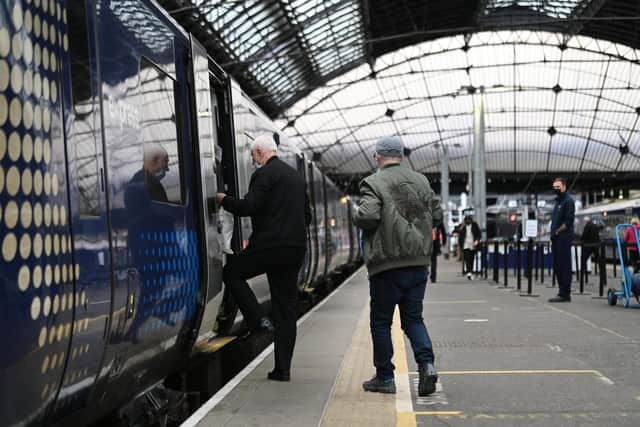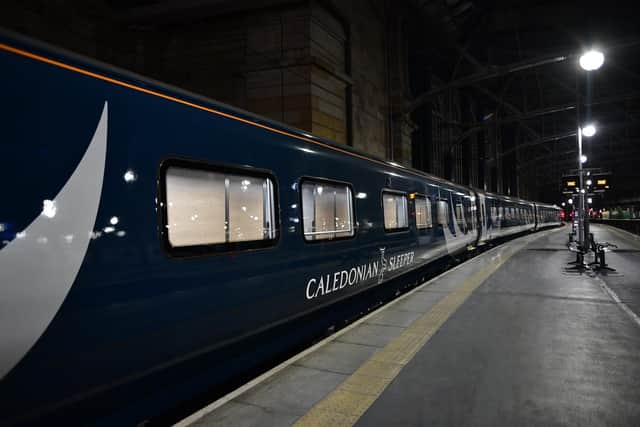COP26 ScotRail strike threat by RMT: Which trains would still run and what is the dispute about?
and live on Freeview channel 276
ScotRail’s biggest union has announced walkouts from Monday 1 to Friday 12 November – the entire duration of the United Nations summit conference in Glasgow, during which thousands of those involved were expected to travel by train.
It would mark an escalation of the RMT’s Sunday stoppages which have continued every week since March, leaving most of Scotland without any ScotRail services.
Will any ScotRail trains run if the strikes go ahead?


Yes, but only a very few.
Advertisement
Hide AdAdvertisement
Hide AdScotRail told The Scotsman on Tuesday that services were likely to be limited to just two lines – the secondary Edinburgh Waverley-Glasgow Queen Street route via Bathgate and Airdrie, and a shuttle service between Glasgow Central and Exhibition Centre, beside the COP26 venue at the Scottish Event Campus.
Why would trains not run on other lines in and around Glasgow like they do during the Sunday strikes?
The RMT plans to call out on strike all its nearly 2,000 ScotRail members, such as those at depots, not just the conductors and ticket examiners involved in the Sunday action so far.


Why is the RMT striking on Sundays?
The union wants an increase in payments for working on days off, or “rest day working”, which are less than those paid to drivers.
ScotRail said drivers are paid higher rates because they have to work on rest days more often than other train crew due to a shortage caused by Covid restrictions delaying the training of new recruits.
What’s the wider RMT-ScotRail dispute about?
Advertisement
Hide AdAdvertisement
Hide AdPay. The union has been seeking a wage rise since it was told there would be a pay freeze at the start of the Covid pandemic 18 months ago.
It said rail staff were key workers who have put themselves at risk working in a front line public service role since the first lockdown.
ScotRail said none of its staff had lost their jobs or been furloughed, unlike many workers in other industries, and it could not afford to offer an increase because of the huge revenue loss caused by passenger numbers falling by up to 90 per cent because of Covid travel restrictions.
It said any increase would have to be financed by productivity savings.
What has the RMT – and ScotRail’s other unions – been offered now?
Advertisement
Hide AdAdvertisement
Hide AdA 4.7 per cent pay increase over two years, comprising 2.5 per cent between April 2021 and March 2022, and 2.2 per cent between April 2022 and March 2023.
They have also been offered a one-off payment of £300 “for contributing to the successful delivery of our rail strategy during COP26”.
ScotRail said the package amounted to a pay rise of between £1,700 and £2,600 on before tax and National Insurance deductions.
It has also further offered the RMT the equivalent of three hours’ additional payment for rest day working, which would also be put to the other unions.
What about the productivity improvements?
Advertisement
Hide AdAdvertisement
Hide AdThey include greater use of mobile technology, station staff helping re-stock ticket machines, the Inter7City train fleet being looked after in-house, more staff briefings online rather than face-to-face, spare staff assisting with ticket checks, and payslips going paperless.
Various other potential changes would be discussed with the unions, including over Sunday working and a further reduction in other face-to-face staff briefings.
What has been the other unions’ reaction been?
The drivers’ union Aslef, engineers union Unite and office staff union TSSA have all accepted the deal.
What happens next?
ScotRail said its offer would only remain on the table to the RMT until Wednesday because it needed time to put contingency plans in place should the strikes go ahead.
What is the atmosphere like between the RMT and ScotRail?
It’s becoming increasingly tetchy.
Advertisement
Hide AdAdvertisement
Hide AdThe union has described Wednesday’s deadline as “wholly arbitrary” and said serious negotiations could not be conducted “with that sort of gun pointed at your head”.
In an internal memo to staff seen by The Scotsman, ScotRail chief operating officer Ian McConnell said: “It seems RMT bosses are intent on sabotaging Scotland’s Railway’s role during COP26.”
Will any other train operators be affected by RMT action?
The union has announced strikes at Caledonian Sleeper over the pay issue between Sunday October 31 and Tuesday November 2, and between Thursday November 11 and Saturday November 13.
These would force the cancellation of its services on October 31 and November 1, 11 and 12 between Aberdeen, Fort William, Inverness and London in both directions.
Advertisement
Hide AdAdvertisement
Hide AdServices between Edinburgh, Glasgow and London in both directions on October 31 and November 1 would still operate, but some departure and arrival times would change.
Caledonian Sleeper said it would provide information about services on those routes for November 11 and 12 “as soon as we can, and we will do all that we can to minimise disruption”.
A message from the Editor:
Thank you for reading this article. We're more reliant on your support than ever as the shift in consumer habits brought about by coronavirus impacts our advertisers.
If you haven't already, please consider supporting our trusted, fact-checked journalism by taking out a digital subscription.
Comment Guidelines
National World encourages reader discussion on our stories. User feedback, insights and back-and-forth exchanges add a rich layer of context to reporting. Please review our Community Guidelines before commenting.